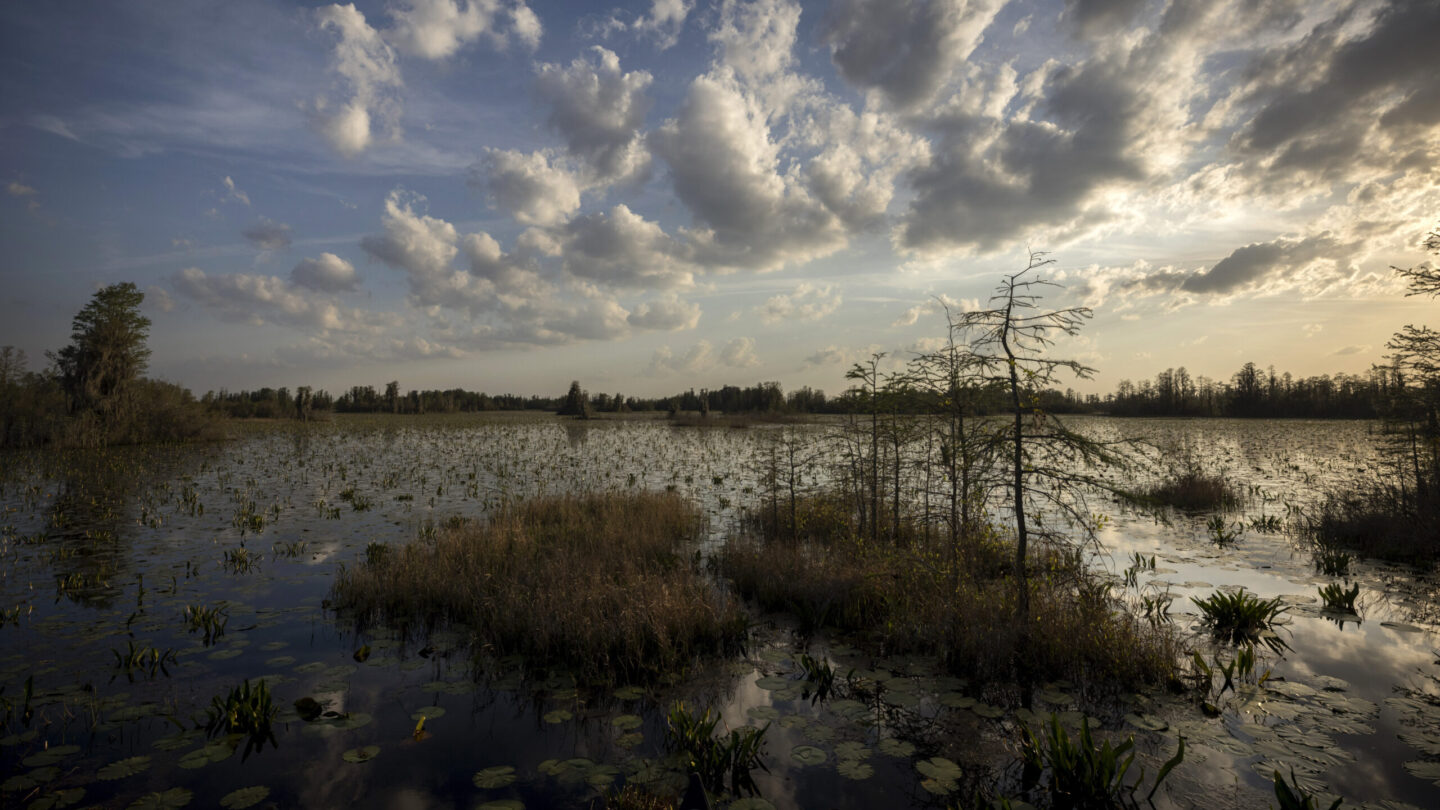Update: On Feb. 15, this story was changed to show that the state is now collecting public comments on the permits for 60 days, rather than 30 as was initially announced.
Georgia’s Environmental Protection Division is issuing draft permits for a controversial proposal to mine for titanium dioxide near the Okefenokee Swamp.
Alabama-based Twin Pines Minerals has been trying for years to develop the mine a few miles outside the Okefenokee National Wildlife Refuge. The company says the mine would bring needed jobs to the rural area.
“We are pleased that, after thorough evaluation of our application, EPD has issued draft permits for the demonstration mine,” said Twin Pines President Steve Ingle in a statement. “We expect stringent government oversight of our mining-to-reclamation project which will be fully protective of the Okefenokee Wildlife Refuge and the region’s environment.”
Environmentalists have pushed back on the company’s claims that the mine won’t harm the swamp. They say the mine could affect water levels and, thus, the ecosystem of the Okefenokee.
Several scientists have completed independent analyses arguing the EPD’s explanations as to how the mine will not harm the swamp have critical errors and are based on the wrong data.
“It’s disappointing that they [the Georgia Environmental Protection Division] are going on with it when it’s common sense not to,” said Rena Peck, executive director of the Georgia River Network. She said her organization wishes the agency would do an analysis that considers more broadly the ecosystem-wide impacts the mine may have.
“It’s too bad that in our process we’re not going to an environmental impact statement-level study that the feds would have required, where we’re looking at cumulative impacts, not just this starter mine,” Peck said.
It’s a twist of timing that the more stringent federal environmental review process isn’t required.
The Trump Administration rolled back water protection rules that had been expanded by the Obama Administration. Though Biden’s Environmental Protection Agency reinstated the more stringent rules, permitting for the Twin Pines project got underway when the Trump-era rules were in place.
Even after that, the path for the mine hasn’t been straightforward.
The U.S. Army Corps of Engineers attempted to revisit the finding that the federal government had no jurisdiction over the mine, saying it had failed to consult with the Muscogee (Creek) Nation about their ancestral homeland.
Throughout 2022, the Corps and Twin Pines debated that point, eventually settling a lawsuit out of court.
And there have been other issues.
In 2019, Twin Pines was found to have falsely claimed it had a lease on its neighbor’s property, but the company was able to revise the permit with no penalty. Just last month, the company received a $20,000 fine from the EPD for exploratory drilling work conducted without the proper bonding and licensing.
The permits come during a busy season at the Georgia state capitol for swamp advocates. In recent weeks groups have rallied at the Gold Dome for House Bill 71, a law aimed at protecting the areas near the proposed mining site from future development, though the bill wouldn’t affect the current mining proposal.
The Okefenokee Protection Act, as the bill is called, is carrying 94 bipartisan co-sponsors but has been waylaid in the House Natural Resources Committee. Until it receives a vote at the committee level, it cannot progress toward becoming a law, and so far there’s no indication it is getting anywhere this year, either.
Activists have also promoted the impact of the environmental tourism industry on towns near the Okefenokee, such as Folkston. And they’ve rallied around the bid to get the swamp listed as a UNESCO World Heritage Site.
Local governments around the state have passed resolutions opposing the mine. Several communities in the Okefenokee region, including Ware, Clinch and Echols counties, have come out against the proposal, as have governments farther afield like Savannah and Dekalb County.
Charlton County, where the mine would be, passed a resolution in 2019 supporting the plan. Commissioners cited the promised jobs.
This isn’t the first time a mine has been proposed for the area. In the 1990s, the chemical company Du Pont pitched a much larger operation. Du Pont didn’t proceed with that plan after a visit from then-President Bill Clinton’s interior secretary, Bruce Babbitt, who said he thought the company would not be able to prove it wouldn’t damage the swamp.
In 2022, Biden’s Interior Secretary Deb Haaland visited the Okefenokee. She later wrote a letter to Gov. Brian Kemp, urging him to deny permits for the mine.
Now that the state environmental protection division has issued draft permits for the project, there will be a 60-day public comment period, including a virtual public meeting in early March. Initially, the state had announced a 30-day comment period for the permits.
Even before these draft permits were released, the mine had garnered more public comments than any other question the EPD has historically handled. So far, that’s been a total of approximately 78,747 comments, which included 115 verbal comments in the virtual public meetings and 78,632 written comments received by email or mail.










